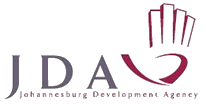Users of vibrant Jeppe Park were given an opportunity to get involved in the redesign of their community’s public space at an event organised by social enterprise Bjala on Sunday, 4 September.
Johannesburg City Parks and Zoo (JCPZ) and the Johannesburg Development Agency (JDA) will be collaborating on an upgrade of the facility in 2017, and have partnered on the project’s design with Bjala, an organisation that is intimately involved in the community.
Bjala and members of the community have been lobbying for some time for an upgrade of Jeppe Park, which is located in the densely populated inner city suburb of Jeppestown and must rank as one of Johannesburg’s most-used – and best-used – urban green spaces.
WELL USED, HIGHLY VALUED BY 5 STAKEHOLDER GROUPS
Besides the children and residents from the immediate neighbourhood who meet here informally to relax, socialise and play, there 5 stakeholder groups who make regular use of Jeppe Park – and whose activities, when they coincide, always do so harmoniously.
Jeppe Park Primary, which provides quality but affordable education for the children of low-income learners, is located across the road from the park, and makes good use of the space the facility offers for its learners to exercise and play.
The park is also the venue for amateur and would-be professional soccer players, who meet after work and play long into the evening on weekdays; for Saturday gatherings of members of the Shembe Church; and for migrant workers staying in the hostels in and around Jeppestown, who meet in organised groups on Sunday mornings to share news from home and other matters of mutual concern.
Lastly, there are the fiercely contested ngoma dance competitions, involving men’s teams specialising in various styles from hostels around the city, which fill the air with pulsating music and draw large crowds of spectators to the park on Sunday afternoons.
JEPPE PARK ‘DIFFERENT FROM MOST OTHER PARKS IN JOBURG’
“Jeppe Park is a different park,” said Jabulani Khwela, who was helping Bjala with the setup and running of the outreach event, and kindly took time out to describe the five user groups and their activities.
A documentary filmmaker who grew up, lives and works in the area, Khwela believes it is important for him as an artist to be part of the change in the area.
He went through an artists’ incubation programme with Bjala, and is one of the collaborators working on the Jeppe Park Superdream, an exchange project between artists in Jeppestown and Gateshead in the UK which seeks to build skills while activating local parks.
“There’s a lot of different grouping and cultural gatherings here, which you don’t see in many parks around Johannesburg. Jeppe Park has a lot of history behind it, for example the Shembe Church meetings have been going on since I was a boy and even before, so it’s a park that has a great deal of meaning for me.”
Bjala’s outreach event, held under JDA and JPCZ auspices, drew input from all the stakeholder groups as well as from residents in general.
Interactive questionnaires set out on tables made it easy for community members to become part of the redesign of the park – a partnership which is central to Bjala’s, and the JDA’s, modus operandi when it comes to redeveloping public spaces.
PARTNERING WITH THE COMMUNITY FOR IMPROVED PUBLIC SPACES
Chantal Mann, Urban Programme Manager at Bjala, said the organisation saw its role in public space redevelopment “as to join with the community in helping to advocate for improvement of public space and better utilisation of it.
“This is a very densely populated area, and people need a place to come and relax and enjoy the sun,” Mann said, noting that the park had huge potential for providing still greater value to the community.
“It’s an already very well utilised park, a beautiful piece of public space, and very valued by everyone, as you can see,” she said.
Once these groups had all shared their thoughts about what they wanted to see, these ideas would be translated into technical designs for the JDA/JPCZ project managers to use to implement the park upgrade, starting with the process of tendering for contractors.
Besides public space, arts and community, Mann explained, Bjala sought to effect changes in the areas of affordable housing for low-income urban groups, quality education for inner city children, and community-focused job creation.
In all of these, she said, the JDA and other City agencies were important partners in sharing advice and information and – as in the case of this event – co-ordinating their efforts to improve the lives of Joburg’s urban communities.

